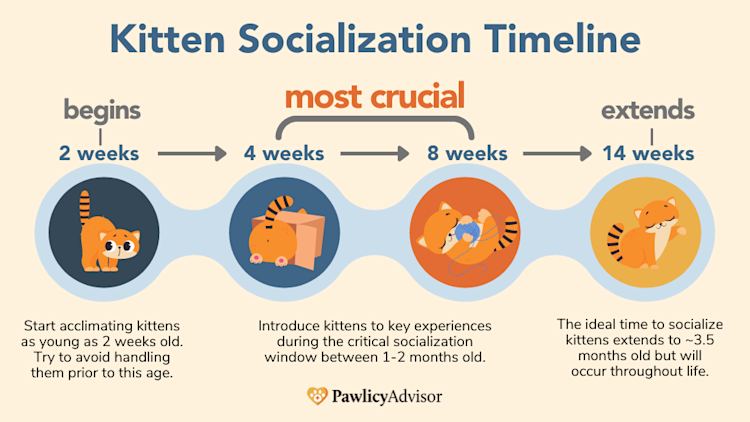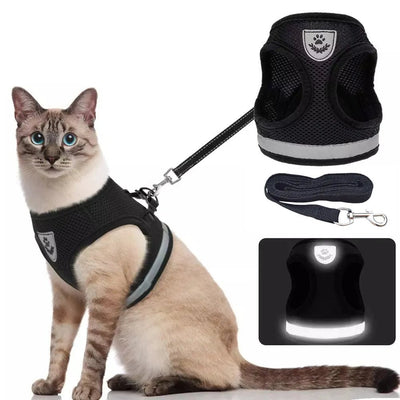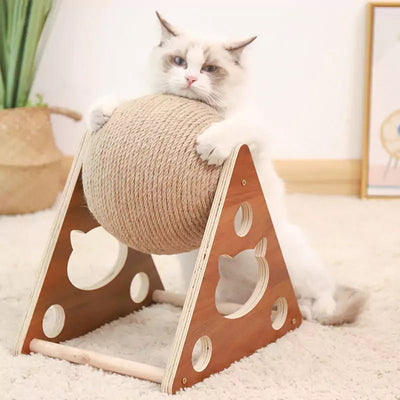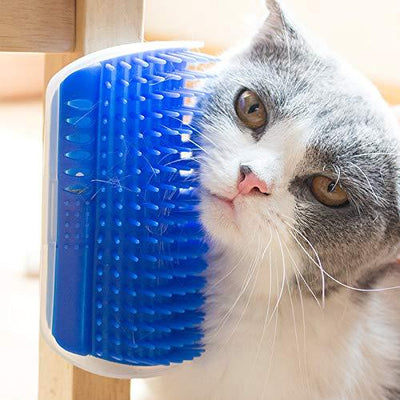 .
.
All young cats require early socialization in order to become friendly and confident companions. Kitten socialization facilitates learning by teaching young cats how to safely interact with humans, objects, and other animals so they can feel safe in their own homes.
This guide will cover some essential experiences you’ll want to socialize your kitten with while they are still young and within the prime age range to create mental connections with world experiences. We’ll provide valuable tips on how to socialize a kitten so you can avoid several common mistakes and ensure that your baby kitty grows up to be a well-adjusted and fear-free cat in adulthood.
Use the links below to learn more about kitten socialization:
- When to Start Socializing Kittens
- Kitten Socialization Chart
- Kitten Socialization Guide
- Key Takeaways
- FAQs on Kitten Socialization
When to Start Socializing Kittens
Kittens have a pretty short socialization window, so you’ll want to start acclimating them as early as two weeks old. The first eight weeks of life are critical for social and behavioral development in kittens.

If you miss this window, know that kitten socialization can continue fairly easily up to 14 weeks. You can also successfully socialize older cats, although it might require more patience and time. Young cats who don’t have contact with humans soon after birth will become feral, regardless of whether their mother is an indoor cat or wild.
Kitten Socialization Chart
Use this kitten socialization chart to introduce your young cat to new situations, people, sounds, places, experiences, and animals in a positive and controlled manner.
Socializing kittens with people, places, animals, and sensations
| Category | Experience |
|---|---|
| People | • Women • Men • Elderly • Teenagers • Children • in wheelchairs • using walkers, crutches, or canes • pushing a babystroller • running • carrying objects • wearing a helmet, hat, mask, or sunglasses |
| Places | • Garden or yard • Garage or attic • Vet clinic • Pet store • Boarding facility or cattery • Coffee shop • Main road • Shopping center • Public places |
| Animals | • Other kittens • Older cats • Puppies • Dogs • Guinea pigs • Birds • Reptiles • Other pets • Farm animals • Rabbits • Squirrels |
| Sounds | • Vehicles • TV and music • Home appliances • Heater or fan • Power tools • Vaccuum cleaner • Hair dryer • Doorbell • Music instruments • Bicycles and skateboards • Lawnmower • Garbage bins • Barking dogs • Sliding doors • Hose or sprinklers • Alarm or smoke detector • Sirens • Fireworks |
| Situations | • Driving in a car • Traveling in a pet carrier • Wearing a leash or harness • Looking at a mirror • Going up the stairs or elevator |
| Surfaces | • Wooden floors • Glass (tables or shelves) • Tiles or linoleum • Rugs or carpet • Grass • Sand • Gravel, concrete, pavement • Wet, icy surfaces • Rubber • Balcony or heights |
| Weather | • Thunder and lightning • Rain • Puddles • Wind • Snow |
| Scents | • Clothes smelling of other people • Catnip • Safe herbs (i.e. valerian)• Fresh grass clippings • Topical medications • Anti-scratch spray • Urine-off spray • Unusual scents (i.e. citrus) • Strong scents (i.e. fish) |
| Handling | • Hugging • Rocking • Touch nose • Pinch skin • Squeeze paws • Examine mouth, teeth, and gums • Hold the kitten on its back • Gently inspect eyes • Wipe body with towel • Retract nails on paws • Prepare nail trimming • Put on a harness or collar |
Socializing kittens with objects
| Category | Object |
|---|---|
| Foods | • Cat food (wet and dry) • Other pets' food • Pet treats • Safe human foods for cats • Frozen or unusual foods |
| Toys | • Feathers • Balls • Cardboard box • Cotton reels • Plush toys • Glass/plastic bottle • Toy with bell • Wands |
| Litter Box & Substrate | • Plastic or paper tray • Liners • Sandpit • Hooded/open/top entry litter box • Self-cleaning litter box • Disposable litter box • Silica gel litter • Biodegradable litter • Clumping/non-clumping litter • Storage container • Synthetic grass |
| Climbing Structures | • Cat walkway • Lookout cat bed • Cat trees • Floating cat shelves • Cupboards • Bookcases • Hammock • Lookout cat bed • Drawers • Doll beds |
| Scratching Posts | • Wood • Sisal rope • Horizontal/vertical scratcher • Plywood • Carpet • Tree log • Cardboard |
| Miscellaneous | • Crate • Bedding • Umbrellas • Balloons • Mop • Flags or banners • Puzzle feeder • Bubble wrap • Target stick • Clicker • Water fountain • Agility equipment • Exercise equipment • Enclosure/catio |
Kitten Socialization Guide
How to socialize a kitten with humans
People come in all shapes and sizes, so introducing your kitten to as many people as possible is a good idea. Allow them to become accustomed to strangers, but be careful not to overwhelm them with a great display of affection. They'll be less likely to acquire a fear of strangers later in life if you act more reserved versus in their face with enthusiasm.
Know that kittens can easily become tired, so keep meeting periods with new individuals short and allow your pet to rest between interactions. In general, a few 15-minute socialization sessions per day should be enough.
How to socialize a kitten with other cats
Cats are highly territorial, and if you already have one, they might think they own your home. A new kitten can feel like a threat to that ownership, so it’s vital to make introductions slowly. It might be a good idea to keep the kitten separated for several days.
Give each cat an item with the other animal’s scent, such as a blanket. Once your cats get used to each other’s scents, you can allow them to interact face-to-face, but keep a watchful eye to ensure they’re getting along okay.
Note: Before introducing a new kitten to other pets in the household, call your vet to ensure all existing animals are current on their vaccinations and in good health.
How to socialize a kitten with dogs
Cats and dogs can become great friends, but it takes time. A couple tips to help socialize kittens with dogs include:
- Feeding pets before sessions to eliminate potential possessiveness over food
- Taking your dog for a walk beforehand to burn off some energy so that they behave more calmly and move less erratically
- Keep your dog on a leash during introductions to prevent any sudden lunges
- Allow your kitten to take the lead by approaching when they feel up to it, rather than vice versa
- Don't force anything; break and try again another day if your dog barks excessively or becomes aggressive, or your cat hisses, lifts its back, or appears distressed
Another strategy is to separate pets into visible, adjoining rooms for brief periods using a divider like a baby gate, allowing them to grow acquainted with each other's scents and behaviors at a safe and comfortable distance.
Patience is the key here. It could take weeks or even months before they are at ease, but in the end, their budding best friendship will be well worth the effort.
How to socialize a scared, skittish, or shy kitten
Some shy or fearful kittens learn to trust people immediately, while others take longer. The difference depends on their temperament, age at first socialization, and the amount of time devoted to socializing your kitten.
Scared kittens will require a lot of time early on, along with reasonable expectations, and patience not to push them beyond their comfort zones. Many of them will be at ease with their primary caregivers, only to become quickly frightened, hestitant, or cautious around strangers and unfamiliar situations.
To socialize a skittish kitten, start with a small, safe place. A quiet room or a bathroom works well for this purpose. A larger environment can be overwhelming and the cat will seek refuge in hiding spots that are difficult to reach.
Spending time in a smaller area at first will help your kitten become more accustomed to you before growing aquainted with all their surroundings. You can gradually increase their living space as they get more comfortable with you, with the goal of them coming to the sound of your voice if and when they hide, versus you having to pull them out of a tight space.
It's easier to socialize a fearful kitten in a reasonably peaceful home. A household with numerous individuals will be more difficult, especially if it includes small children or transient people (e.g., roommates).
Key Takeaways
- Socializing kittens is about teaching your pet that the world is a safe place where cats, humans, and other animals are friendly, and new experiences don’t have to be scary.
- Although the first four to eight weeks are crucial, socialization is a lifelong process. Older cats can also be socialized, although it requires more time and patience.
- Keep in mind that socialization is only one part of your pet’s future success; a nutritious diet, proper exercise, and quality vet care are also crucial to raising a healthy and happy kitten.
FAQs on Kitten Socialization
When can you start picking kittens up?
If possible, wait until the kittens are at least two weeks old before handling them. Until this age, the mother cat will be highly protective, but the kittens are also more prone to illness and infection.
How long does it take to socialize a kitten?
A kitten younger than four months old can take anywhere from one to four weeks to socialize.
The length of time will depend on the kitten's personality, how much time you spend with them, and how old they are when you begin the socialization process (the younger the kitten, the quicker the process will be).
Some older kittens with a more independent or untrusting nature may take several months of daily work to come around, especially if they've been conditioned by negative experiences in their past.
Can a 3-month old kitten be socialized?
Yes. Although the crucial socialization timeframe for kittens is between four and eight weeks old, it’s still possible to socialize a 3-month (12-week) old cat after this ideal window has closed. Socializing a kitten becomes more difficult as they grow older, but you can tame them with reasonable success until they are six or seven months old.
If your cat is older, you might want to consult a professional pet behavioralist, especially if your cat shows signs of aggression or fear.
How do you get kittens to like you?
Repeated positive exposures and food are the best ways to gain a kitten’s trust and get them to like you. Sit calmly with the kitten, talk to them, and be sure it understands that you’re a source of tasty treats and food.
You can also use an interactive wand toy to help the kitty play and decompress in your presence. Depending on the kitten’s personality and age, this process could take days or weeks.
Can you socialize a feral kitten?
The socialization of feral kittens requires a daily time commitment. How long it takes will depend on the kittens' age plus the amount of time and consistency spent working with them. If handled at an early age — eight weeks or less — you can socialize feral kittens pretty quickly.
Remember to keep safety in mind while socializing feral cats, as they can bite and transmit disease. Be very careful when handling any feral kitten you find before they see a veterinarian.
Kaelee Nelson is a die-hard dog mom, part-time dog trainer, and ultimate pet enthusiast. She recently rescued a puppy named Zoey who went from the streets of Mexico to the big lights in L.A. after Kaelee helped her become officially studio-trained for production work, with the goal of strengthen her dog's confidence as well as the bond they share. Kaelee remains passionate about pets in her role as Content Marketing Manager by helping owners prepare for the financial burden that often comes with giving our furry BFFs the best care possible. Enrolling Zoey in a pet insurance policy was a no-brainer for Kaelee, as it enabled her to get reimbursed for vet costs like spaying, vaccinations, routine care, and more.



















































































